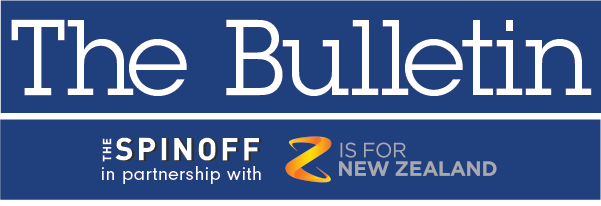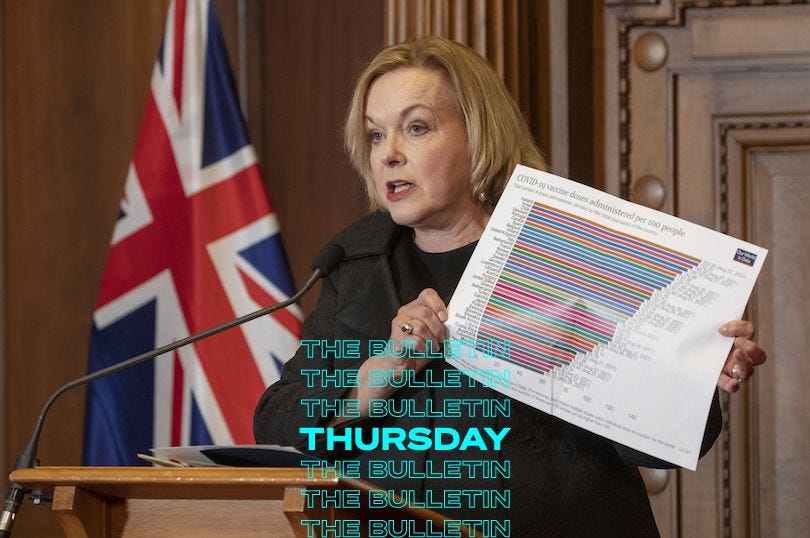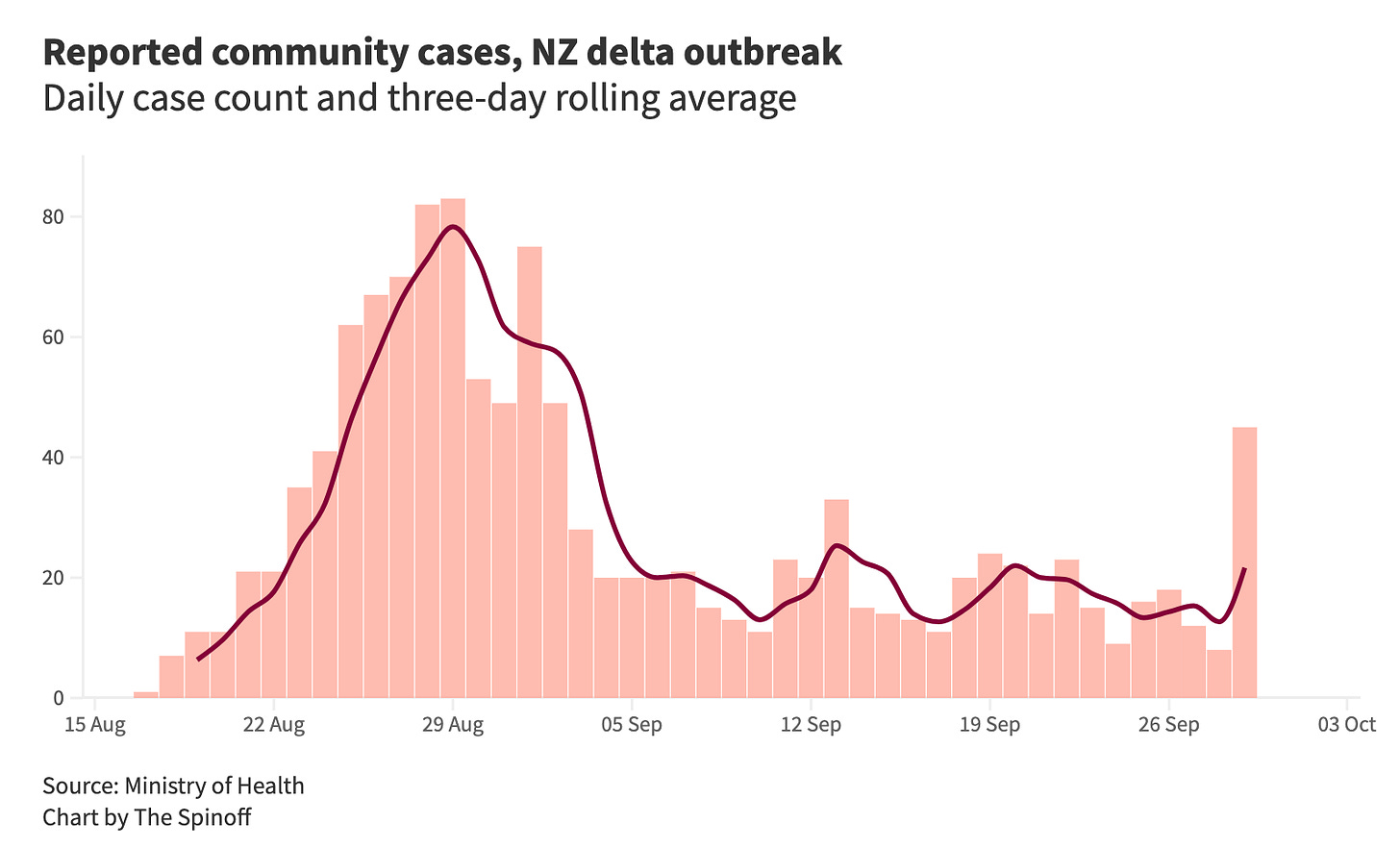National releases its pandemic plan
The detailed proposal opens the way for a deeper debate about how New Zealand deals with the future of Covid-19
Mōrena and welcome to The Bulletin for Thursday, September 30, by Justin Giovannetti. Presented in partnership with Z Energy.
In today’s edition: A large class action launched against ASB and ANZ banks, a spike in Auckland’s Covid cases, big immigration news, but first, National’s pandemic plan.
Judith Collins at a press conference in August 2021. (Mark Mitchell-Pool/Getty Images)
An opposition plan for opening up New Zealand. National has released a comprehensive programme for how it thinks the country should respond to the Covid-19 pandemic over the coming 12 months. At its core, the plan moves New Zealand away from the elimination strategy to one of “vigorous suppression”. Alice Neville has written an explainer of National’s package for The Spinoff.
Some more details. The party has called for a crash programme to get the country vaccinated, with more use of a focus on using schools and GPs. It would also implement rapid testing rapidly, something the government’s own Roche report called for a year ago. The Covid response would be moved out of Wellington to a new agency called Te Korowai Kōkiri in Manukau. Finally, it wants the country to build a dedicated managed-isolation facility by early next year. The timeline is heroic but National’s Covid-19 spokesman says it’s worth a try. There’s more, it’s a 58-page document that doesn’t lack for ideas.
Overall, it largely mirrors much of the Labour government’s own plan, although with firmer targets in some cases. Those specifics are open to debate. Without access to the machinery of the public service, with its advisors and number crunchers, the opposition plan lacks proper modelling—something the government has already pointed out. Try this quiz from Toby Manhire to see if you can tell the plans apart.
Why would we do all of this? The delta variant is in New Zealand and after over a month of lockdown, it’s still spreading through the country’s largest city. While there’s an all-of-parliament push to vaccinate the country (which is a nice bit of cross-partisan cooperation) there’s no agreement on what comes next. National’s plan is about staking out a position in that debate. As Stuff reports, the party wants vaccinated travellers coming from low-risk countries to be able to skip managed-isolation once more than 85% of the population is vaccinated. Those coming from medium-risk countries would be able to isolate at home for seven days. The government has floated a similar idea, but it hasn’t provided a vaccination target or timeline. The prime minister has indicated some easing of border restrictions is possible next year, probably at the end of a “classic Kiwi summer”.
A future with Covid-19 requires investment in the country’s hospitals. As RNZ notes, National’s plan also calls for a concerted effort to strengthen hospitals and ICUs. Nationwide capacity has barely increased in New Zealand since the start of the pandemic. National’s plan follows a similar, but far less detailed, piece of work released by Act earlier this week. According to Stuff, the competing plans now mean the country can engage in a debate about what way to go. One element of that debate, reflected in the focus on ICUs, will be how many could die or be hospitalised from reopening the border even at high vaccination levels. All opening plans, even the one being advanced by Jacinda Ardern, create an additional risk of lost lives.
On day one it turned into an argument around Christmas. National says it wants to focus on vaccines and reopen the border for fully vaccinated residents coming from low and medium-risk countries by Christmas. Chris Bishop, the party’s Covid-19 spokesperson, called the current system for allocating limited spaces in managed isolation a “lottery of human misery”. The government has said the timeline is too aggressive but hasn’t offered an alternative. Instead, deputy prime minister Grant Robertson responded to the plan with a new Christmas carol in the house: “On the first day of Christmas, National gave to me…Covid.” A similar line had been tried out earlier in the afternoon by Covid-19 response minister Chris Hipkins, only minutes after revealing 45 new community cases in Auckland. My sense is that a glib take probably wasn't what the country was looking for. The government’s Covid-19 response, while successful so far, was thrown together in a hurry, under enormous pressure. Some parts of it are in need of attention. The opposition, which of late has been making headlines for ill-discipline and an inability to focus on what’s important, has put in the effort to put forward a reasonable proposal and a serious debate seems warranted.
If you like what you’re reading, we need your support. The Spinoff is doing our utmost to keep you updated on Covid-19 related news. Every dollar our members contribute directly funds our editorial team and is devoted to ensuring we do more. Click here to learn how you can support the team today.
Are yesterday’s 45 Covid cases a blip or the start of something new? The NZ Herald reports that the spike in Auckland's case numbers is the result of the city’s move to level three a week earlier and could remain elevated for some time. We should know within a few days. While the director-general of health said most of the cases were in households, or were close contacts of existing cases and expected, it was jarring news after the previous day’s total had fallen into the single digits. A bigger issue is that many of the cases involve groups of people in transitional housing. Important questions are now being raised about whether enough was done to support Auckland's marginalised communities during this lockdown.
The Covid numbers: 45 new community cases were reported yesterday in Auckland and 50% (4) of the previous day’s total were in the community while infectious. There are now 244 active cases. 44,649 people were vaccinated on Tuesday, of which 70% were second doses.
The Spinoff’s Covid data tracker has the latest figures.
A large class action lawsuit has been launched against ANZ and ASB. The banks face allegations that they failed to refund fees owed to 150,000 customers, according to RNZ. The class action follows two settlements with the Commerce Commission where the banks acknowledged they'd failed to provide accurate information to some customers taking out loans. Despite the banks paying out nearly $40 million in the settlements, the action claims that customers are entitled to all the money they were overcharged. In effect, banks can't keep money they were never allowed to charge.
Oranga Tamariki promises to stop nearly all child uplifts after damning report. The child protection agency has been at the centre of near constant scandal in recent years and children's minister Kelvin Davis has promised that he'll now be a “bulldozer” for change. As Stuff reports, the agency was found to be "weak, disconnected and unfit" after an investigation. It’s structure and culture were also found to be problematic and needing a complete overhaul. The uplift, or removal of children from their families, will only happen now when there's no viable alternative, Davis pledged.
In breaking news: The government is providing residency to 165,000 migrants already in New Zealand. Immigration minister Kris Faafoi's office announced early this morning that a one-off visa is being created due to Covid-19 restrictions. The programme is expected to grant residency to 5,000 health workers, 9,000 in primary industries and at least 800 teachers. It’ll be a relief for migrants in the country who have had to contend with an uncertain situation and could help reunite families separated by border restrictions. In response, Federated Farmers said that “there will be big smiles in cowsheds and tractors across the country after this announcement”.
The future of mass transit in the capital is now down to two options. The Dominion Post reports that Wellingtonians will be asked to choose between light rail or “bendy buses” under two options prepared by Let’s Get Wellington Moving. As part of a rethink of the city’s core, a mass transit system is going to be built from the railway station to the airport. Bus rapid transit would be more flexible and cheaper to set up, while trams could carry more people but tracks need to be installed. While the airport has long been the expected destination, there are reports it could be switched to Island Bay. The latter option would put pressure on increasing density in Newtown.
An update on last week’s story about Berlin’s housing referendum. Berliners approved a referendum question to expropriate over 240,000 apartments in the city from private owners, according to Reuters. About 56% voted in favour, a sign of growing frustration with increasingly unaffordable housing in the city.
Got some feedback about The Bulletin, or anything in the news?
Get in touch with me at thebulletin@thespinoff.co.nz
Right now on The Spinoff: Josie Adams reports in the latest instalment of IRL about people using love doctors to get through online dating. Alex Kazemi looks at the pandemic through the lens of uncertainty and concludes that caution comes first. Apisalome Movono and Regina Scheyvens write that the Pacific Islands are trying to figure out when and how to reopen. (Christmas, anyone?) Tara Ward helps us take a break from all this with new power rankings from Celebrity Treasure Island. Jihee Junn explores the Netflix hit Squid Game and what makes it so disturbing.
China’s energy crisis is likely to impact the globe. Amid everything else in the world, China has had the equivalent of massive rolling national blackouts in recent days to deal with carbon emissions. As Fortune reports, street lights are being turned off, elevators in apartment blocks are stalling and factories making iPhones and Teslas are going dark. It’s an incredible situation in the world's second largest economy and the maker of much of the stuff we buy. Here’s a sample:
Ordinarily, Chinese authorities spare household consumers from the shock of power outages, preferring to force industrial users to scale back their energy usage first—which they have. On Sunday, several Apple and Tesla suppliers announced days-long factory closures to comply with orders from local authorities to ration electricity.
But targeting industry alone hasn't been enough. With Beijing lumbering towards its 2060 deadline of achieving a net-zero carbon economy, ordinary citizens have discovered rather suddenly that they will have to adjust, too.
For the love of cricket. The Bounce looks at Jarrod Kimber, who it describes as the “most intelligent and versatile chronicler of the great game.” It’s a bold claim to conclude that the best writer about New Zealand cricket is an Australian based in the UK, but there’s a strong attempt to back it up. The story is a long look at why someone not only falls in love with cricket, but then devotes so much of their time to the passion.
That's it for The Bulletin. If you want to support the work we do at The Spinoff, please check out our membership programme.








